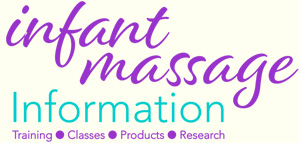Babies who are born prematurely are very sensitive to any kind of stimulation. Since touch is the first sense to develop in a fetus, this sense is strong no matter when a baby is born. Developmentally appropriate touch, such as skin-to-skin contact or kangaroo care, is welcomed by many babies in those early weeks. Still touch, such as hand-cradling and resting hands, provided by the parent, can be reassuring to a baby and encourage bonding and attachment.

As a baby finds physical stability and reaches full-term development, she or he may be open to a communication dialogue with the parent that includes touch and eventually massage. In our trainings we teach a five-step dialogue for touch communication, to guide the parent to prepare the environment, observe the child, and ask permission; start slowly when the baby is ready; pay attention to their baby’s cues at all times, give touch the baby is ready for; and end slowly and thoughtfully before the baby is tired. A perceptive instructor can help a parent recognize what a baby is communicating, and how to respond throughout the dialogue. S/he acts both as a guide and as a witness throughout the learning process.
In our trainings, we cover working with the family of the premature baby as part of our four-day training. This information is helpful for nurses, OTs and others who work with families in the hospital, and for those who work in early intervention and home visiting programs after the baby is released from the hospital. A section on Special Needs in the training helps professionals teach families infant massage as a child grows older.
